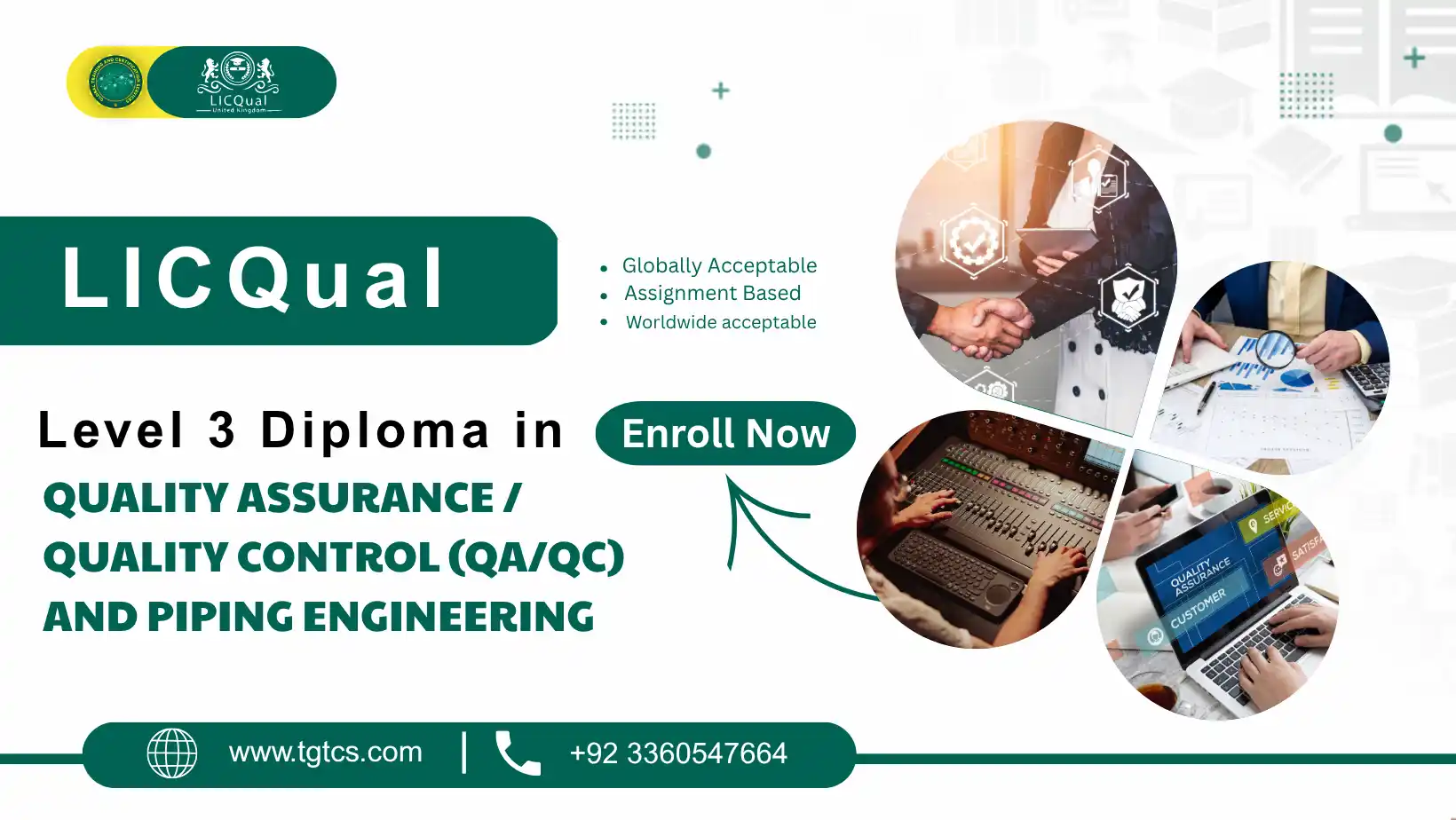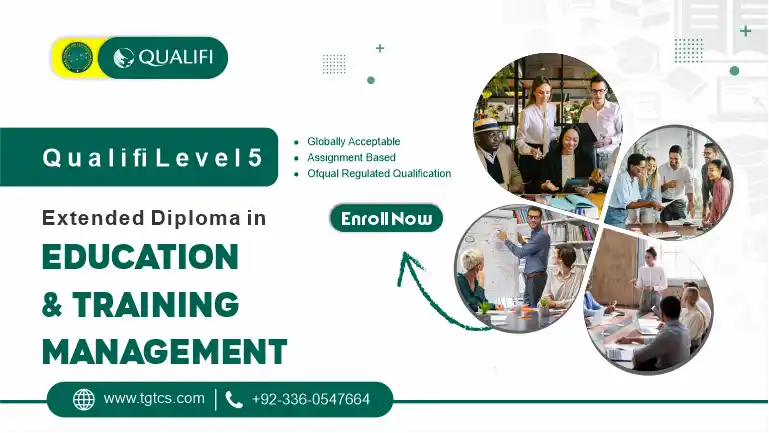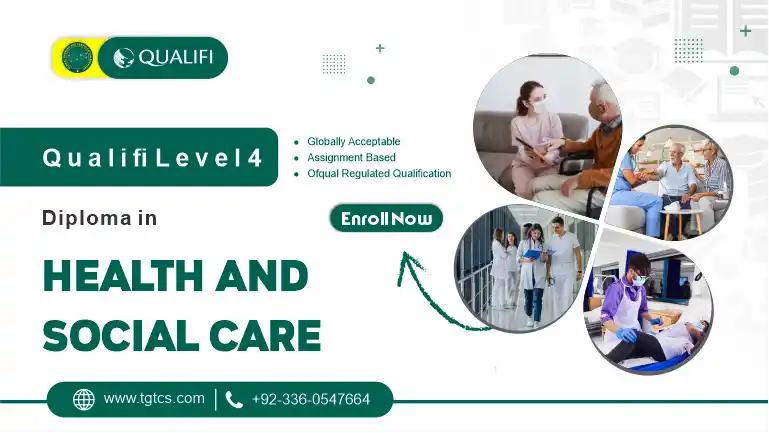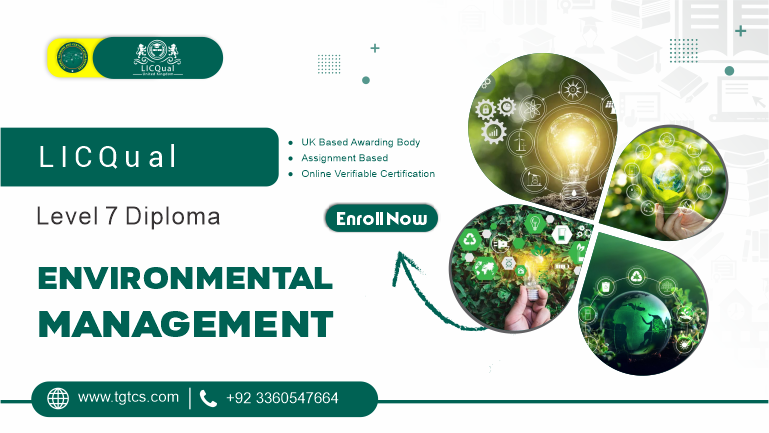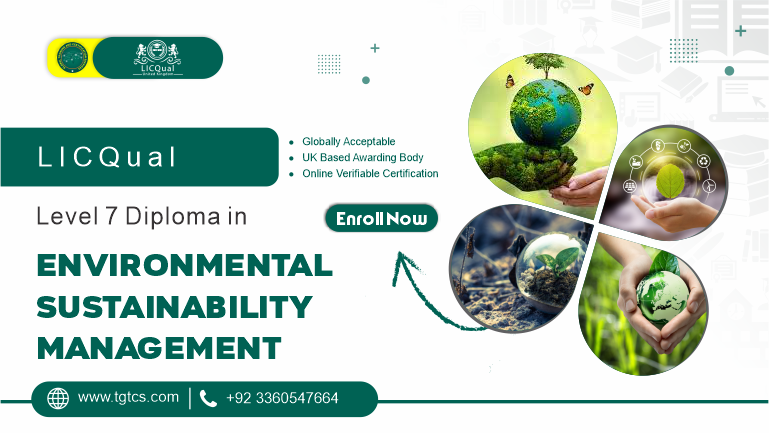LICQual Level 3 Diploma in Quality Assurance / Quality Control (QA/QC) and Piping Engineering
The LICQual Level 3 Diploma in Quality Assurance / Quality Control (QA/QC) and Piping Engineering is an internationally recognised qualification designed to build a strong foundation in inspection, quality control, and piping system management. This diploma equips learners with the essential skills needed to work in the oil, gas, petrochemical, and construction industries, where QA/QC professionals and piping engineers are in constant demand.
As a British Council verifiable, MOFA and Embassy attestable certification, this diploma is highly valuable for securing overseas employment, job approvals, and iqama processing in Gulf countries and beyond. It offers learners the opportunity to gain both technical knowledge and practical expertise that align with international codes and standards such as ASME, API, and ASTM.
The program focuses on piping materials, welding procedures, NDT basics, QA/QC systems, and compliance with global safety regulations. Learners will develop professional confidence and career-ready skills that make them competitive candidates for inspection and engineering roles worldwide.
Whether you are a fresh graduate, technician, or professional looking to upgrade your qualifications, the LICQual Level 3 Diploma in QA/QC and Piping Engineering serves as a powerful entry point into the industry. It also provides a clear pathway to higher-level diplomas and advanced career opportunities in quality assurance and piping engineering.
The Global Training and Certification Services is Approved Training Centre of ICTQual AB UK Ltd
The LICQual Level 3 Diploma in Quality Assurance / Quality Control (QA/QC) and Piping Engineering is a career-focused qualification designed to prepare learners for roles in piping inspection, welding inspection, and quality control within the oil, gas, petrochemical, and construction industries. This diploma provides both theoretical knowledge and practical skills in QA/QC processes, piping systems, and international engineering standards.
Recognised worldwide and British Council verifiable, MOFA and Embassy attestable, this certification is highly valuable for overseas employment, job approvals, and iqama processing in Gulf countries. It ensures that learners gain an internationally trusted qualification that strengthens their professional profile and enhances career mobility across global industries.
Key Highlights of the Course
- British Council verifiable, MOFA and Embassy attestable certification
- Globally recognised qualification for QA/QC and piping professionals
- Comprehensive training in piping engineering, welding inspection, and QA/QC systems
- Industry-relevant curriculum aligned with ASME, API, ASTM, and ISO standards
- Designed to support international employment and iqama approval processes
What You Will Learn
- Fundamental principles of quality assurance and quality control in engineering projects
- Piping materials, fabrication methods, and inspection techniques
- Welding processes, inspection methods, and documentation requirements
- Basics of Non-Destructive Testing (NDT) and its role in QA/QC
- Application of international codes and standards to ensure compliance and safety
- Reporting, auditing, and documentation practices used in QA/QC systems
Why Choose This Diploma
- Enhances employability in oil, gas, petrochemical, and construction industries
- Provides international recognition for job seekers and professionals
- Builds strong technical and inspection skills for entry-level and mid-level careers
- Serves as a stepping stone towards advanced qualifications in QA/QC and piping engineering
- Increases career opportunities abroad with iqama approval and job verification benefits
The LICQual Level 3 Diploma in QA/QC and Piping Engineering is the perfect qualification for learners seeking international recognition, industry-relevant training, and a solid career pathway in quality assurance, quality control, and piping inspection.
Mandatory Unit
- Introduction to QA/QC and Piping Engineering
- Piping Materials, Components, and Fabrication
- International Codes and Standards in QA/QC and Piping
- Welding Processes and Visual Inspection Techniques
- Non-Destructive Testing (NDT) Methods
- QA/QC Documentation and Reporting
By the end of this course, applicants will be able to:
1: Introduction to QA/QC and Piping Engineering
Learning Outcomes:
By the end of this unit, learners will be able to:
- Define the fundamental concepts of Quality Assurance and Quality Control.
- Describe the roles and responsibilities of QA/QC professionals in engineering projects.
- Identify the basic components and functions of piping systems.
- Explain the significance of quality control in project success and regulatory compliance.
- Recognize career pathways within the QA/QC and piping engineering field.
2: Piping Materials, Components, and Fabrication
Learning Outcomes:
By the end of this unit, learners will be able to:
- Identify various piping materials and their industrial applications.
- Describe the functions of valves, fittings, flanges, gaskets, and other components.
- Understand fabrication processes such as cutting, welding, and assembling.
- Interpret basic isometric drawings and fabrication shop practices.
- Ensure compliance with specifications during piping fabrication.
3: International Codes and Standards in QA/QC and Piping
Learning Outcomes:
By the end of this unit, learners will be able to:
- Identify and explain the purpose of international standards such as ASME, ASTM, API, and ISO.
- Apply relevant codes to inspection, fabrication, and testing procedures.
- Evaluate engineering documentation against quality standards.
- Recognize the role of regulatory compliance in global projects.
- Use codes to support decision-making in quality control operations.
4: Welding Processes and Visual Inspection Techniques
Learning Outcomes:
By the end of this unit, learners will be able to:
- Explain key welding methods including SMAW, GTAW, GMAW, and FCAW.
- Identify welding defects and interpret welding symbols on drawings.
- Perform basic visual inspection of welds using standard procedures.
- Understand the content and purpose of WPS and WPQ documentation.
- Ensure welding work meets quality and safety requirements.
5: Non-Destructive Testing (NDT) Methods
Learning Outcomes:
By the end of this unit, learners will be able to:
- Describe the principles of common NDT methods: UT, RT, PT, MT, and VT.
- Select appropriate NDT techniques based on material and defect type.
- Interpret NDT results and identify common types of flaws.
- Follow safety practices during NDT inspection procedures.
- Understand the limitations and advantages of each NDT method.
6: QA/QC Documentation and Reporting
Learning Outcomes:
By the end of this unit, learners will be able to:
- Prepare inspection reports, checklists, and ITPs in line with project requirements.
- Maintain traceability records for materials and welds.
- Identify and report non-conformities effectively.
- Support quality audits through accurate documentation.
- Demonstrate professional QA/QC communication and reporting skills.
The LICQual Level 3 Diploma in Quality Assurance / Quality Control (QA/QC) and Piping Engineering provides learners with industry-relevant skills, international recognition, and career advancement opportunities. This diploma is ideal for those looking to secure overseas employment, enhance their technical expertise, and gain qualifications that are trusted globally. With British Council verification and MOFA/Embassy attestation, it is one of the most reliable certifications for job approval and iqama processing in Gulf countries.
Global Recognition and Verification
- British Council verifiable qualification
- MOFA and Embassy attestable for international acceptance
- Recognised in Gulf countries and worldwide job markets
- Supports job approval and iqama processing
- Adds credibility to your professional profile
Career Advancement Opportunities
- Opens doors to oil, gas, petrochemical, and construction industries
- Enhances chances of securing overseas jobs in high-demand sectors
- Strengthens eligibility for inspection and piping engineering roles
- Provides a stepping stone for higher-level diplomas in QA/QC and engineering
- Builds a long-term career pathway with global mobility
Industry-Relevant Knowledge
- Comprehensive training in QA/QC systems and piping inspection
- Exposure to welding processes, inspection methods, and NDT basics
- Aligned with ASME, API, ASTM, and ISO international standards
- Focus on safety compliance and documentation practices
- Equips learners with practical and theoretical expertise
Professional Skill Development
- Improves technical inspection and auditing skills
- Enhances documentation, reporting, and compliance knowledge
- Builds confidence to work in complex engineering projects
- Develops problem-solving abilities in QA/QC roles
- Strengthens teamwork and communication skills for industry environments
By completing this diploma, learners not only gain technical mastery but also secure international recognition that boosts their employability. This course is a powerful credential for anyone seeking professional growth, overseas opportunities, and a successful career in QA/QC and piping engineering. control and piping inspection.
The LICQual Level 3 Diploma in Quality Assurance / Quality Control (QA/QC) and Piping Engineering is designed for individuals who want to start or strengthen their career in inspection, quality management, and piping system engineering. This diploma is ideal for those who are seeking international recognition, overseas employment, and industry-relevant training that opens doors to global career opportunities.
Fresh Graduates and Beginners
- Students or graduates looking to enter the oil, gas, and petrochemical sectors
- Individuals seeking a recognised qualification to start a career in QA/QC
- Learners with basic knowledge of engineering concepts who want professional training
- Job seekers aiming for entry-level roles in piping inspection and quality control
- Beginners who want to build a strong technical foundation
Engineering and Technical Professionals
- Technicians and engineers working in piping, welding, or construction fields
- QA/QC professionals seeking formal recognition of their skills
- Employees in engineering industries who want career growth and promotions
- Workers aiming to transition from general technical roles into inspection and QA/QC
- Professionals looking to upgrade their qualifications for overseas employment
Career Changers
- Individuals from other technical fields aiming to move into QA/QC and inspection
- Workers seeking stable and high-demand roles in Gulf and international markets
- Professionals who want to shift to quality-focused positions in engineering projects
- Employees planning to enter industries with better global opportunities
- Candidates wanting to strengthen their CV with an internationally recognised diploma
Overseas Job Seekers
- Learners aiming for Gulf countries where QA/QC piping inspectors are highly demanded
- Professionals looking for qualifications that support job approval and iqama processing
- Job seekers requiring British Council verifiable and Embassy/MOFA attestable certification
- Candidates targeting secure, long-term employment abroad
- Individuals wanting an international qualification for better mobility
Lifelong Learners and Ambitious Professionals
- Learners interested in continuous professional development (CPD)
- Ambitious professionals planning to progress to Level 4, Level 5, or higher diplomas
- Candidates eager to stay updated with international codes and standards (ASME, API, ASTM)
- Individuals who value career growth and global recognition
- Professionals dedicated to building a future-proof career in QA/QC and piping engineering
This diploma is the perfect match for learners at different stages of their careers. Whether you are just starting out, already working in technical roles, or planning a shift towards international employment, the LICQual Level 3 Diploma in QA/QC and Piping Engineering gives you the qualifications, confidence, and recognition to move forward successfully.
Course Overview
Course Level
Level 3
Course Units
6 Units
Credits
60
